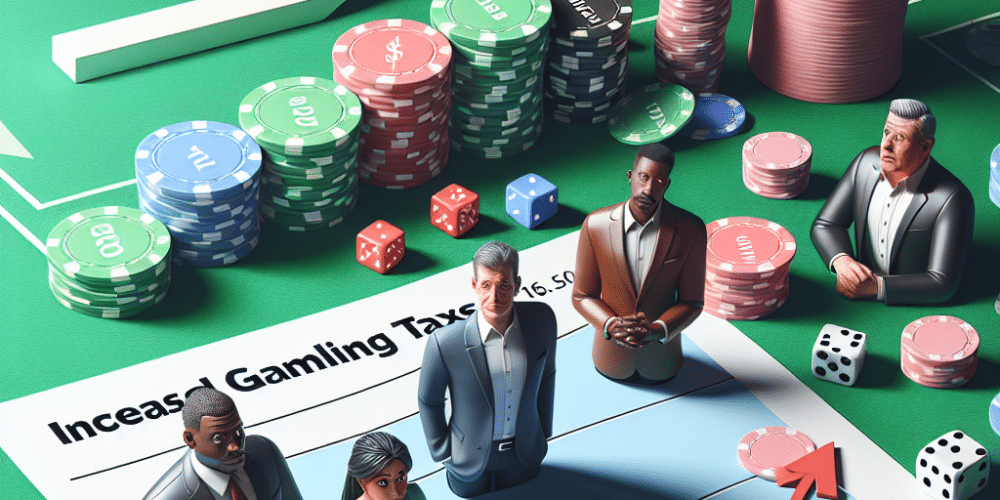The UK government is moving forward with its proposal to increase taxes on gambling operators, despite warnings from industry leaders about potential negative impacts on employment, the possibility of driving players to unregulated sites, and a decrease in funding for British sports. The government is exploring a proportional tax system that imposes higher taxes on more harmful types of gambling activities.
Recently, the Treasury Select Committee released a report urging the government to disregard what it termed as “industry scaremongering” and to implement a tax rate that addresses the escalating social harm from online gambling. This report comes just as Chancellor Rachel Reeves prepares to deliver her first Budget, addressing the UK’s significant fiscal deficit.
Chaired by Dame Meg Hillier, the cross-party committee highlighted that online gambling now accounts for nearly half of the UK’s total gambling revenue. The report noted that while traditional forms of betting, such as horse racing and bingo, are generally considered safe, online casino games and virtual slots have led to a surge in high-frequency, high-loss gambling behaviors.
The committee emphasized that online betting games are extracting significant amounts of money from individuals drawn into addictive and harmful segments of the industry, often beginning with a simple interest in sports or casual bingo games. Over months of evidence sessions, the committee explored balancing tax policy with economic growth and social responsibility. MPs dismissed concerns that increased taxes would drive consumers to unregulated operators, instead advocating for stronger measures against illegal offshore sites.
On the other hand, representatives from the gambling industry remain adamantly opposed to the proposed tax increases. Grainne Hurst, the chief executive of the Betting and Gaming Council (BGC), argued that the gambling sector is already among the most heavily taxed in the UK, contributing £4 billion annually to the Treasury and supporting over 100,000 jobs. She warned that further tax hikes could have detrimental effects on the broader economy.
Hurst also informed MPs that the industry invests significantly in safer gambling measures, such as affordability checks, stake limits, and data-driven monitoring systems. Despite these efforts, the Treasury Committee remained skeptical. The report criticized the industry’s assertions that gambling poses no social harm, highlighting how gambling platforms use player data and behavioral insights to encourage extended play and increased losses.
The growing impacts of problem gambling in communities are undeniable, and the industry’s bold claim that it causes no social harm was met with disbelief by the committee. The report’s findings underscore a need for policy changes to address these concerns.
As Chancellor Reeves prepares her Budget, there is speculation that online casino and slot games might face a higher tax rate compared to sports betting. Treasury insiders suggest that MPs are considering a graduated tax system based on the relative risk of harm associated with different gambling activities. With the government showing no sign of backing down in the face of industry pressure, it seems likely that the era of uniform gambling taxation is ending.
While some industry advocates argue that regulating and taxing the sector more heavily will only push consumers toward unlicensed operators, others believe that a robust regulatory framework can prevent this outcome. By enhancing enforcement measures against unregulated sites and ensuring that domestic operators adhere to the highest safety standards, the UK government could mitigate potential negative impacts.
Furthermore, the argument that current taxation levels are already sufficient is countered by evidence of growing social costs associated with gambling addiction. The societal burden of problem gambling, including mental health issues and financial strains on individuals and families, supports the case for higher taxes aimed at reducing these harms.
As the debate continues, the UK government faces the challenge of crafting a tax policy that sustains essential public funding while safeguarding vulnerable individuals and promoting responsible gambling practices. The outcome of this policy discussion will have significant implications for the gambling industry, consumers, and broader society.
A counterpoint to the government’s proposed action is the potential risk of reduced investment in community sports. The gambling industry contributes significant funding to sports sponsorships and grassroots initiatives, and changes in taxation could impact these contributions. Balancing the need for public health protection with the benefits of industry support for sports will be a complex task.
Ultimately, the government’s decision will need to consider a wide range of factors, including economic implications, social responsibility, and the broader public interest. As Chancellor Reeves prepares to unveil her Budget, the UK awaits to see how these complex issues will be addressed in her fiscal strategy.

















